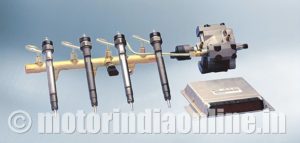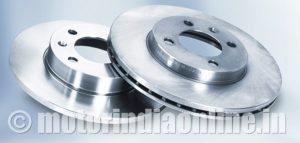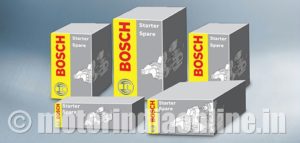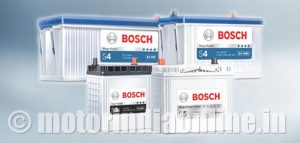Bosch Ltd. has posted total revenue from operations of Rs. 11,690 crores in 2017-18, registering a 12 per cent increase in the same period the previous year. While its domestic sales have been growing steadily, its Mobility Solutions business has shown an increase by 15 per cent in 2017-18, domestic sales moved up by 14.8 per cent and export sales increased by 16.8 per cent.
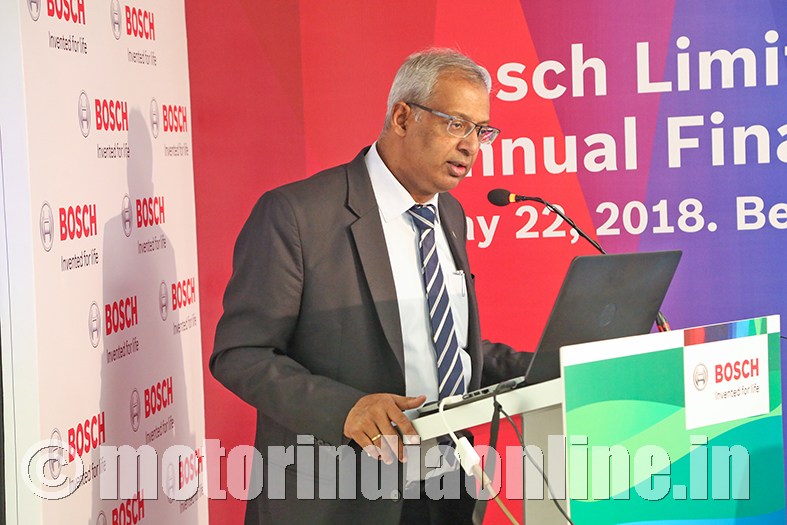
Profit before tax (PBT) stood at Rs. 2,134 crores or 18.3 per cent of total revenue from operations, meaning a 1.9 per cent increase over the same period of the previous year on account of higher sales volume, which is offset by product mix change.
Mr. Soumitra Bhattacharya, Managing Director, Bosch Ltd., commented: “The trend has been bullish. Since 2014, India has had a stable government. Even if demonetization has had its pros and cons, GST implementation has been an important transformation. Government’s budgetary support to agriculture is good while the MET forecast has been normal. All this is a good sign because 55 per cent of our population is in the hinterland.”
Explaining the Government’s mandate to increase the maximum amount of gratuity payable to an employee from Rs. 10 lakhs to Rs. 20 lakhs and how it has resulted in a ‘one time past service cost’, he shared the resultant figures: “The PBT after exceptional items stood at Rs. 2041 crores, which shows a decline of 2.6 per cent over the previous year.”
Further, the net profit after tax (PAT) from continuing operations, before exceptional item, is Rs. 1,464 crores, registering an increase of 1.4 per cent over the previous year. PAT from continuing operations after exceptional item has decreased by 5.1 per cent over the previous year.
Mr. Bhattacharya also touched upon the areas that have received major investments in the last 12 months: “Last year, major investments were made towards the development of new products and setting up facilities at new locations, namely, Bidadi and Nasik. In total, the company made an investment of about Rs. 460 crores in 2017-18.”
He also stressed the importance of India as a market for Bosch, and in line with it, the ‘investment has been consistent’.
Speaking about the automotive production and the industry adapting new norms, he said: “In the HCV segment, with the implementation of GST, the efficiency has increased with higher haulages and better roads. It is good news. In the automotive aftermarket, Bosch Ltd. has come back with a high single-digit growth after two years. Regarding the emission legislation change, India has done the fastest change in the world. Germany took eight years to go from Euro IV to VI, but we are planning to do it in three years. It would mean that by April 2020 BS VI would be introduced. Never before in the history of the automotive industry in India have we had changes that we have witnessed in, say, emission legislation changes, off-highway norms, safety and crash standards, among others, and that too in such a short time.”
In India, the automotive industry contributes 7.1 per cent of the total GDP, and he pronounced that ‘automotive production is doing well’.
The 96-year-old company, since it set foot in India, has the highest number of R&D engineers, pegged at around 19,000. And that is the second highest number after its parent company in Germany.
Quoting an example of the ‘innovation roadmap’, Mr. Bhattacharya said: “We have evolved from remote park assist to integrated cruise assist to the latest automated valet parking. By the end of the coming two years, we would be even offering highway to pilot to urban pilot assist too.”
Mr. Bhattacharya also spoke about the company’s outlook in India. “By 2020, 100 per cent of Bosch products will be IP-enabled and in India we are looking at creating ‘affordable’ innovation.”
He added: “Going forward, if the GDP growth in 2018-19 is over seven per cent, it would be fine. We are seeing strong green shoots across the economy, and this momentum should continue for the growth to accelerate in the coming year too. Our focus in future is BS VI deliverables along with achieving long-term sustainability.”
Mr. Bhattacharya emphasized the transformative nature of Bosch and explained how the company is interested in looking beyond mobility to create effective solutions for a ‘connected future’.
He said: “Our major focus will include using big data for energy-compliant processes, deploying digital solutions to get power tools into the hands of more tradesmen and securing hubs of urban movement with smart surveillance solutions. These are a few of our initiatives.”
Globally, the Bosch Group expects its sales revenue to grow by 2-3 per cent in 2018 and is buoyed by the fact that the results for the first quarter of this year matched the same in the given time period last year.
